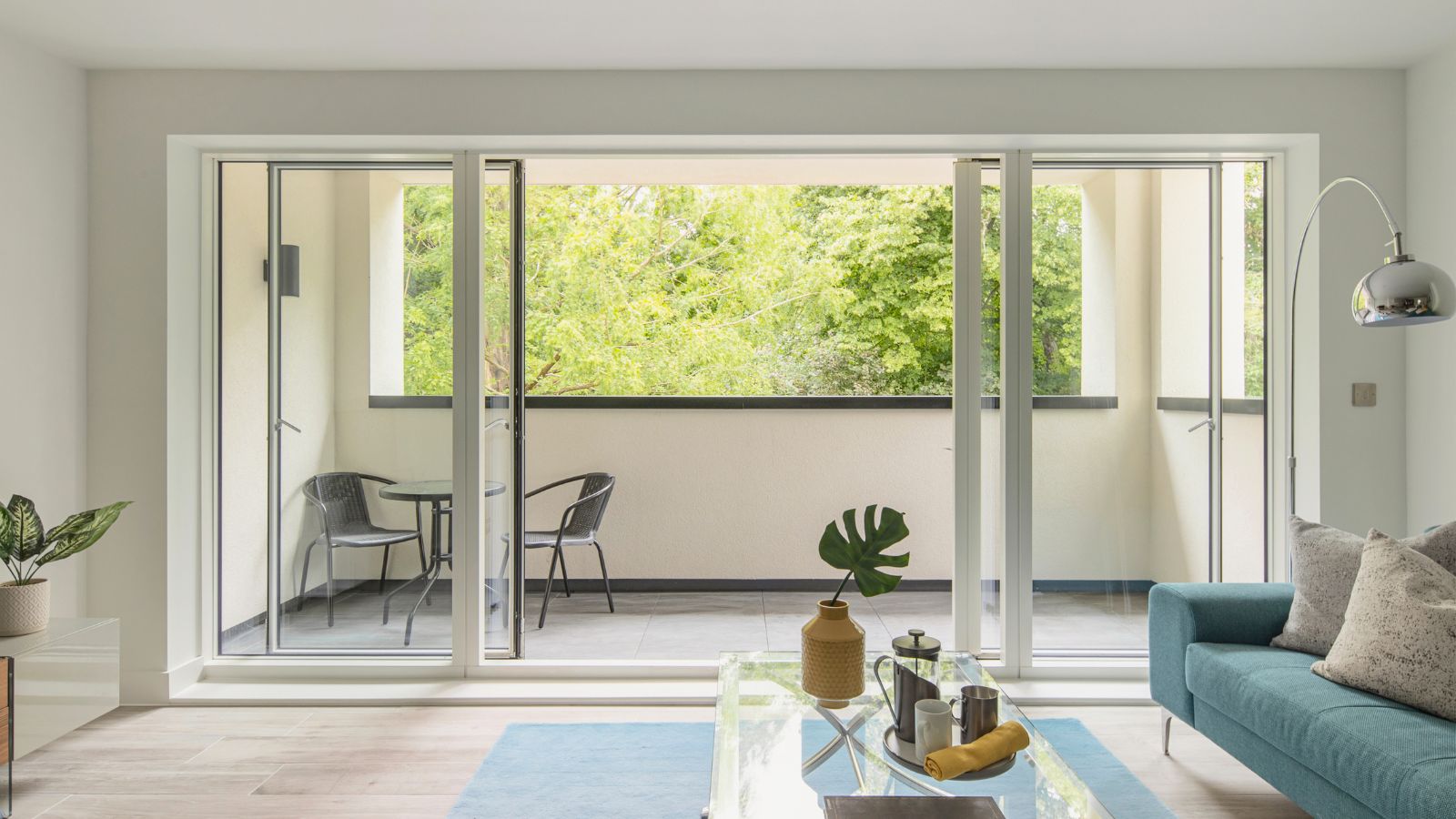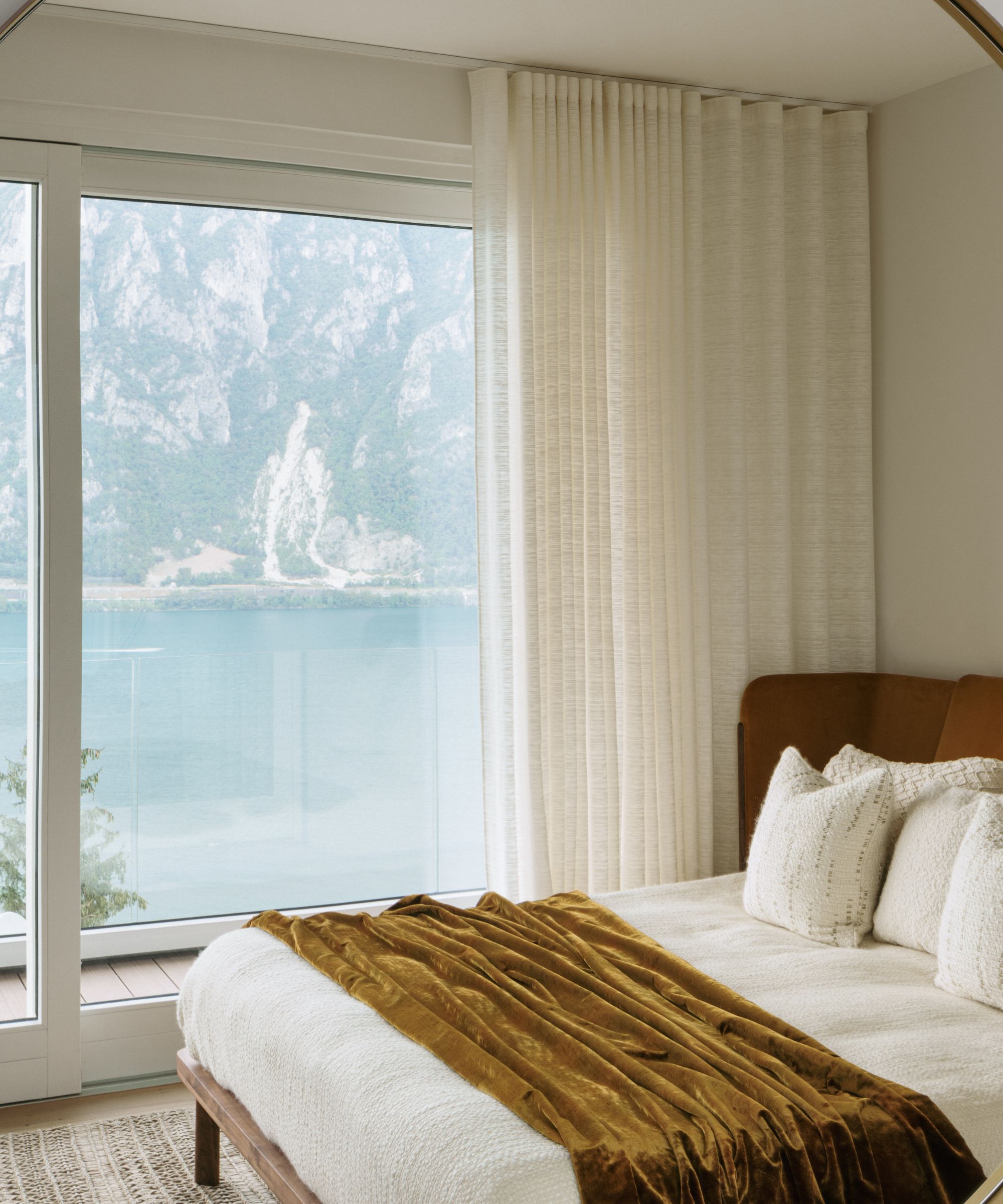
Often on the smaller side, apartments should be easier to keep cool than a whole house but, in reality, they are actually more prone to heat retention – making them hotter and less manageable in the summer months, especially in a heatwave.
While most modern apartments have air conditioning installed to help cool down a room, older buildings or those requiring maintenance may be left without on the hottest days of the year. So, how do you cool down an apartment in summer without AC?
Here, HVAC experts have shared their thoughts.
How to keep an apartment cool
Between cooling a room with fans and blocking out the sunlight, many of the ways of cooling down an apartment in summer are similar to keeping a home cool in a heatwave. That being said, there are some important caveats to note when living in a space high up or surrounded on almost all sides.

1. Use blackout curtains in apartments where windows don't fully open
Some apartments, especially those in high rises, may not have fully opening windows (or windows that open at all) to help lower the temperature. If this is the case, then Brad Roberson, HVAC expert and president at Aire Serv, a Neighborly company suggests using blackout curtains to keep heat out during the day.
‘Blackout curtains can help make a room cooler by reducing heat,’ he explains. ‘This is done by the curtains having a tightly woven fabric. The design blocks sunlight, and as a result, a comfortable temperature in your home can be maintained.’
It is important to note that it is not just any blackout curtains that will help with this, however, he notes. ‘Several companies manufacture blackout curtains and reducing heat really depends on the product’s quality, the home’s current insulation, and the window type, so it may not be the best solution used on its own.’
2. Or opt for reflective window film to redirect sun rays
If you do not have blackout curtains in your apartment and are either unable to change them or don't fancy switching out your decor just for summer, then reflective window film could be a better option, points out Tony Abate, VP and chief technology officer at AtmosAir Solutions. These coatings are reflective on the outside but allow the inside occupant to see out, with the added benefit of helping reduce solar gain by reflecting the sun's rays out before they heat up your furnishings.
‘These measures are especially important on the higher floors. All buildings are subject to what is called the “stack effect” where warm air travels upward so higher floors will get hotter,’ Tony explains.
3. DIY an air cooler with a damp sheet and a fan
Cooling a room with fans is an obvious go-to in any space without an AC, but a standard fan alone may not be enough to lower the temperature in your living space. Instead, Josh Mitchell, HVAC technician and founder of Air Conditioner Lab recommends placing your fan behind a wet sheet or towel to help circulate cool air – especially when paired with the best fan you can afford.
‘In one particular apartment, I noticed that my bedroom was always hotter than the living room because of its location. I hung a wet sheet over the entrance to the living room and placed a fan behind it. This created a cool breeze that lowered the temperature in my bedroom,’ he explains.
4. Place fans strategically to improve airflow
Fans can also be used to help redirect air around your space and improve the internal airflow in an apartment that may be surrounded by other tall heat-generating buildings, says Jacky Chou, principal, and director at home blog, Archute.
‘Position fans strategically to create cross-ventilation by placing one fan near an open window or balcony door and another on the opposite side of the apartment. This will help draw in fresh air and push out hot air if you don't have an air circulating AC built in.’
If you have a ceiling fan, running it counterclockwise – the best fan direction to cool a room – can also help with this by drawing hot air upwards and out of open windows and doors.
5. Minimize activities that generate heat
A great home remedy to stay cool without spending, avoiding heat-generating activities is a must if you don't have an air conditioner. This includes avoiding using the stove and clothes dryer and other heat-producing appliances, ‘even flat-screen TVs and computers, especially during the daytime hours, as these all produce heat,’ says Tony Abate, chief technology officer.
6. Consider a portable AC unit
There are several air conditioner types you can have in your abode, but a portable AC is the most affordable, especially in an apartment where you may not be able to have it fitted into the building permanently.
‘Those looking only to cool a few square feet may consider this a budget-friendly option from as low as $100 to $200. The bigger the space, the more BTUs you'll need. More BTUs mean more energy use and a higher purchase price, so it is important to note it is not the cheapest way to cool your apartment in summer.
‘Most units will list the square footage they can cool on the packaging, so measure your space before purchasing,’ advises Brad Roberson, HVAC expert.
7. Opt for lighter color decor
It is not a myth that darker colors absorb more heat than lighter colors, so switching out your dark and heavy home decor and bed linens and decorating with neutrals could help make your apartment feel cooler, suggests designer, Jacky Chou.
‘Lighter colors reflect heat, while darker colors absorb it. You should opt for light-colored or neutral furnishings, such as furniture, curtains, and rugs, to help keep your apartment cooler. Luckily, you can add pops of color through accessories and artwork so your home doesn't look bland.’
FAQs
Why do apartments get so hot?
Apartments are very prompt to heat retention, making them hotter than houses, for a few reasons. Firstly, they are often higher up and therefore don't have as much shade as a house would form surrounding trees. Apartments are also surrounded on almost all sides by other apartments which generate their own heat which is moving through the walls to warm up your apartment too. There is also the fact that most apartments are in often found in cities, which are hotter than the suburbs or countryside due to air pollution, often making the air more humid and hotter overall.
Should I close the windows on a hot day?
Although it may seem counterintuitive if it is cooler in your home than it is outside, it may be a good idea to keep your windows closed – even if the temperature difference is minimal. This can help to keep the cooler air inside your home and prevent increasing humidity indoors, making you feel cooler and making it easier to cool down. Instead, open your windows at night when the external temperature drops.
Whether you have the luxury of an opening balcony to seek some outdoor shade or are cooling down a room without windows, these quick air cooling tricks help to keep an apartment more comfortable in heatwaves and hot summers.
It is worth noting, however, that none of these methods will be as effective as a built-in air conditioner and air vents so it is a good idea to temper your expectations. That being said, something is often better than nothing.







